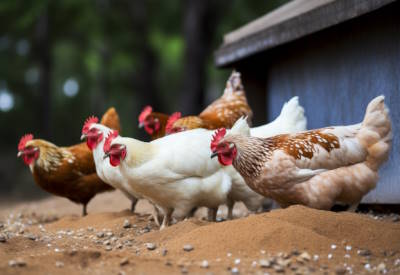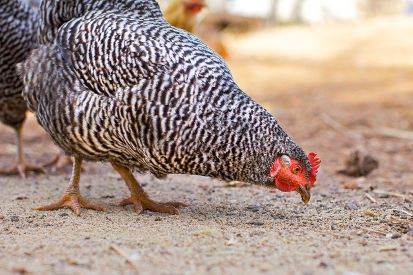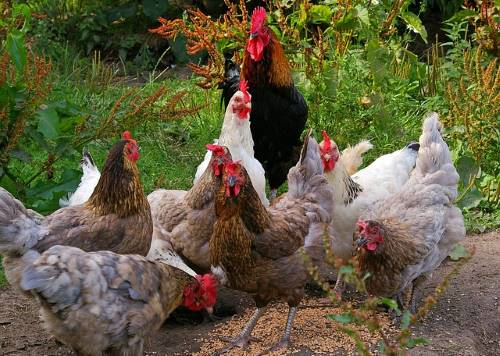Can chickens eat diatomaceous earth? As a fellow chicken owner and enthusiast, I’ve found myself pondering this question on more than one occasion. The short answer is yes, chickens can eat diatomaceous earth. But as with many things in life, the full story is a bit more nuanced.
Raising chickens isn’t just about providing food and shelter; it’s about ensuring our feathered friends have the best quality of life possible. It means being aware of their health and wellbeing, as well as understanding how various substances, like diatomaceous earth, fit into their world. Knowing what benefits or potential risks it might pose is crucial in making informed decisions for our chickens.
Over the course of this article, we’ll take a deep dive into diatomaceous earth’s world as it relates to chickens. From understanding its composition, discovering its benefits, and discussing proper usage, to debunking common myths and sharing practical tips, we aim to provide a comprehensive overview that will empower you as a chicken owner. But first, let’s start with the basics.

Understanding Diatomaceous Earth
Let’s kick things off with a basic understanding of what exactly diatomaceous earth is. You might’ve heard it mentioned in farming circles, but what’s it all about?
Definition and Composition of Diatomaceous Earth
So, diatomaceous earth, in simple terms, is a type of powder made from fossilized marine phytoplankton, also known as diatoms. These tiny, ancient organisms had silica-based cell walls, which, over millions of years, have become the key component of diatomaceous earth.
Types of Diatomaceous Earth
Not all diatomaceous earth is created equal. There’s food-grade, and then there’s pool-grade. Food-grade diatomaceous earth is the one you want for your chickens because it’s safe for ingestion and external use. Pool-grade, on the other hand, is chemically treated and not suitable for animal or human consumption.
[ChickenAffiliate]
Benefits of Diatomaceous Earth for Chickens
Alright, so now we know what diatomaceous earth is, but what’s it good for when it comes to our feathered friends?
Natural Pest Control
Diatomaceous earth is a champ at controlling pests. You see, the microscopic particles are quite sharp and can physically damage external parasites like mites and lice, leading to their dehydration and eventual death. Moreover, it’s been said that diatomaceous earth can also control internal parasites when mixed into feed.
Supplement for Chicken Feed
Speaking of mixing into feed, diatomaceous earth is also seen as a potential supplement for chickens. It contains trace minerals like calcium, which can be beneficial for egg-laying hens. Mixing a small amount of it into their feed is one way of providing these nutrients.
How to Use Diatomaceous Earth for Chickens

So, we’ve got our diatomaceous earth, and we’re ready to use it. But how exactly do we go about that?
Application Methods for External Use
Diatomaceous earth can be added to your chicken’s dust baths, where they’ll naturally apply it to their skin and feathers while bathing. Alternatively, you can gently dust it directly onto your chickens, focusing on areas where parasites are likely to hide.
Feeding Diatomaceous Earth to Chickens
When it comes to feeding, you can mix diatomaceous earth into your chicken feed, or you can offer it in a separate dish for free-choice feeding. Just remember, a little goes a long way. It’s not meant to make up a large part of their diet.
Potential Risks and Downsides
Like anything else, diatomaceous earth isn’t perfect. It has its risks and downsides that you need to be aware of.
Risks of Ingesting Diatomaceous Earth
While it’s generally safe for chickens to eat in small amounts, too much diatomaceous earth might irritate their digestive system. Plus, if they consume too much, they could miss out on other important nutrients in their diet.
Risks of Inhalation
Diatomaceous earth can also be harmful if chickens inhale it, as it can cause respiratory problems. To minimize this risk, always ensure the dust is settled before letting your chickens back into the area, and avoid creating a lot of dust when you’re applying it.
Myths and Misconceptions about Diatomaceous Earth

Diatomaceous earth isn’t some magical cure-all, despite what some people might say. Let’s debunk some myths and misconceptions, shall we?
Debunking Common Misunderstandings
Some folks might tell you that diatomaceous earth can solve all your chicken health problems, but that’s just not true. It’s not a comprehensive parasite control solution or a complete dietary supplement.
Reality Check
Diatomaceous earth has its place in chicken health, but it’s just one tool in the toolbox. It can provide some benefits, but it’s no substitute for a balanced diet, clean living conditions, and appropriate veterinary care when needed.
Frequently Asked Questions

Everyone has questions when they start out with diatomaceous earth. Here’s a selection of frequently asked questions.
Can chickens eat diatomaceous earth?
Yes, chickens can eat diatomaceous earth. It is often mixed into chicken feed as a natural dewormer and a source of trace minerals. However, it should only make up a small portion of their diet.
How does diatomaceous earth work for pest control?
Diatomaceous earth works by causing small cuts in the exoskeleton of insects, which leads to dehydration and death. This makes it a natural and effective pest control solution for external parasites like mites and lice.
Can diatomaceous earth harm chickens?
While generally safe, there are potential risks. Ingesting too much diatomaceous earth may irritate a chicken’s digestive system, and inhalation can potentially cause respiratory problems. Therefore, care should be taken in how it is applied and how much is consumed.
Are there different types of diatomaceous earth?
Yes, there are two types: food-grade and pool-grade. For use with chickens, only food-grade diatomaceous earth should be used as it is safe for ingestion and external use.
Can I use diatomaceous earth with other animals?
Yes, food-grade diatomaceous earth can be used with other animals for similar benefits. However, always do your research or consult with a veterinarian to ensure it’s safe and beneficial for the specific type of animal.
How often should I apply diatomaceous earth?
There’s no set rule for this as it depends on the specific use. For pest control, it may need to be applied more frequently, especially in warm, damp conditions that favor parasite growth. When used as a feed supplement, it’s typically mixed into feed at each feeding.
What Unusual Foods Can Chickens Eat?

We’ve all heard that chickens are like little garbage disposals, right? They can eat a wide variety of food, making them excellent at turning scraps into eggs. But as chicken owners, it’s essential to know the difference between the quirky items they can eat and those they shouldn’t. So, let’s look at some unexpected foods and whether or not they’re okay for our feathered friends.
Egg Shells
Can chickens eat egg shells? Indeed, they can! Egg shells are a great source of calcium, crucial for egg-laying hens. Make sure to crush the shells before feeding them to your chickens to prevent them from developing a taste for their own eggs.
Read More: Can Chickens Eat Egg Shells? Unscrambling The Truth
Coffee Grounds
Coffee grounds? Not so much. While they may not be toxic in small amounts, the caffeine content could potentially lead to health problems. It’s best to keep your morning brew to yourself.
Read More: Can Chickens Eat Coffee Grounds? The Surprising Truth Revealed
Rocks
Rocks might not be food for us, but they’re essential to chickens. Chickens don’t have teeth to chew food. Instead, they ingest small rocks or grit, which stay in their gizzard (a part of their stomach) to help grind down food. Just make sure the rocks are small enough for them to swallow safely.
Read More: Do Chickens Eat Rocks? Unraveling The Gritty Truth
Moldy Food
Moldy food is a no-go. While chickens have pretty robust digestive systems, certain molds can produce toxins that are harmful to them. Always ensure that the food you’re giving your chickens is fresh and safe to eat.
Read More: Can Chickens Eat Moldy Food? Uncovering Facts You Need To Know
Crab Shells
Crab shells can be a surprising but beneficial food for chickens. Like egg shells, they are rich in calcium. However, they should be cooked and crushed before being given to chickens, to kill any potential pathogens and make them easier to eat.
Read More: Can Chickens Eat Crab Shells? Simple Answer & Feeding Tips
Can chickens eat diatomaceous earth – final thoughts
We’ve clucked our way through the ins and outs of diatomaceous earth for chickens, and what a journey it’s been! We’ve pecked our way around the coop, understanding what this fine powder is all about, and discovering that, indeed, our feathered friends can consume it in small amounts. We’ve explored its benefits, like pest control and nutritional supplements, and learned about the appropriate methods to introduce it to our flocks.
Yet, it’s not all sunshine and dust baths. We’ve acknowledged the potential downsides, such as respiratory issues or digestive discomfort, and debunked myths that paint diatomaceous earth as a miracle cure. Just remember, like any tool in our chicken-keeping toolkit, diatomaceous earth has its place, but it shouldn’t replace a balanced diet, proper living conditions, or veterinary care.
Related Articles:
